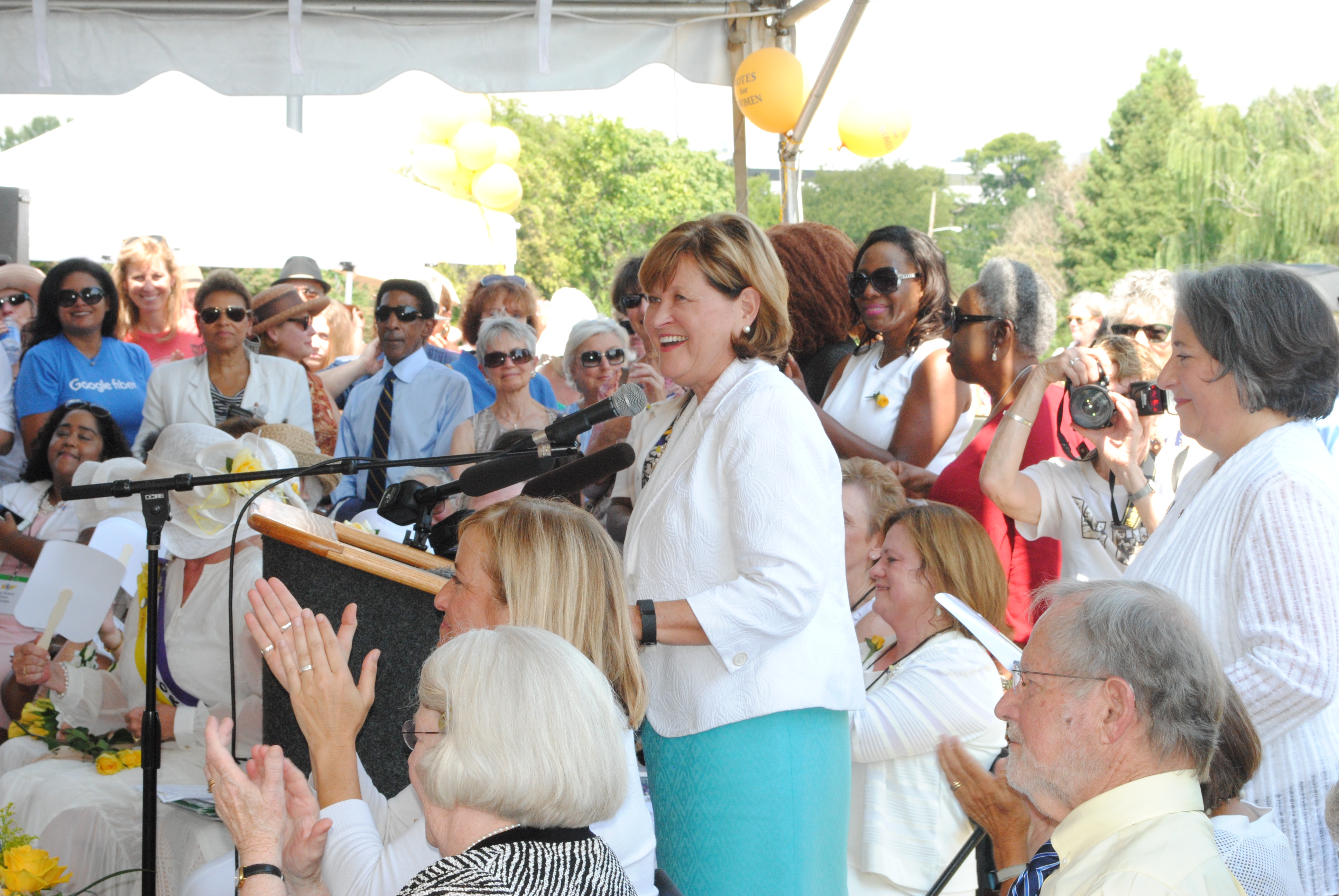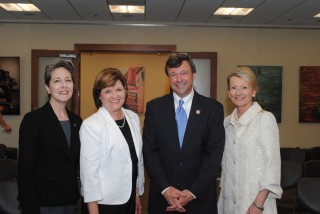Chief Justice Sharon Lee recently presented the Tennessee Supreme Court’s initiatives to Chief Justices from supreme courts across the country at the National Conference of Chief Justices during their annual meeting in Jackson Hole, Wyoming. The gathering in late July was a joint conference with the Conference of State Court Administrators, which Administrative Office of the Court Director Deborah Taylor Tate also attended.
Chief Justice Lee spoke about an outstanding legislative session resulting in appropriations for the judiciary for the largest technology project ever undertaken by the judiciary, the launch of electronic filing, across-the-board raises for staff and seven historic bills to ensure consistency of process and procedures across every juvenile court in Tennessee.
As part of her overall initiatives to modernize the court system, Chief Justice Lee described the top-to-bottom review of the judiciary with particular emphasis on a review of the technology division that serves judges in 31 judicial districts and the appellate courts across the state.
“In order to move the entire court system toward integrated and data accessibility as well as internal and external efficiencies, it is crucial to have the right skillsets in the right seats,” she said. “Whether providing the information for data-driven decisions by the legislature or clearing old dockets, IT and high tech is now critical to the judiciary's role and interaction with the bar as well as our citizens.”
Justice Lee highlighted several major initiatives during her tenure as Chief Justice:
- The Supreme Court’s Access to Justice Initiative continues to be a national model. Tennessee was recently ranked ninth in the nation for providing access to its courts. Each year Tennessee lawyers provide more hours of free legal services to individuals who cannot afford to hire a lawyer. Tennessee ranks ninth in United States and first in the Southeast for providing access to its courts, according to the 2016 Justice Index, a nationwide study that ranks states according to their adoption of selected best practices for ensuring access to justice. Chief Justice Lee had the opportunity to share Tennessee’s success at a White House Forum, a U.S. Senate Briefing and a national conference at New York University Law School.
- The Supreme Court continued its efforts to educate students about government and the role of the judiciary. In 2016, the Court received the Justice Sandra Day O'Connor Award for the Advancement of Civics Education from the National Center for State Courts. This national award recognized the Court’s continued efforts and support of the SCALES program for students at high school and college level to see firsthand the work of the Supreme Court.
- A highly successful business court docket was established to handle complex commercial litigation. Even though Tennessee ranked No. 1 in the U.S. last year for new jobs resulting from foreign-direct investment and received accolades for its business-friendly environment, until 2015, it lacked a specialized complex commercial court docket. The docket has been well-received by the legal community and litigants and to date, nearly 80 cases have been assigned to the court docket.
- In a tight budget year, the Judiciary received additional funding, including a $1.7 million appropriation for a general sessions data repository that will allow for the collection and analysis of data to enable wise, data-driven decisions to be made regarding allocation of resources and needs.
- An indigent representation task force was appointed to review Tennessee’s system of providing constitutionally-mandated representation to indigent parties counsel. The current system costs taxpayers almost $35 million per year and the Task Force was charged with determining how these legal services could be delivered more effectively and efficiently. The Task Force has held listening tours across the state and will make recommendations to the Supreme Court and the legislature. The Court is also implementing an updated payment software system that will more timely pay attorneys for their work, increase efficiencies inside the Administrative Office of the Courts, and enhance audit functions.
- Recovery Courts, including drug courts, veterans’ courts, and mental health courts, continue to expand and in 2016, over $1.4 million was appropriated for the expansion of recovery courts in Tennessee. A human trafficking court docket was created in Davidson County following participation by the Chief Justice, the AOC Director, the Director of the TBI and representatives from the Davidson County District Attorney’s office at a National Summit on Human Trafficking and the State Courts in New York City.
- Tennessee was represented by a multi-disciplinary team of judges and health care professionals at a regional opiate summit in Cincinnati, Ohio to coordinate efforts to combat an epidemic that kills more people in Tennessee than vehicular accidents. The Tennessee judiciary is integrally engaged with all branches of government in seeking to find solutions whether prevention, legislation, or services.
- The MacArthur Foundation has selected Nashville as the site for its 2017 southern region juvenile justice summit, and is one of eight states to participate in developing strategies to reduce child fatalities through the Three Branches Institute. Also, the board of directors of State Justice Institute will hold their board meeting in Nashville in 2017 following the announcement of a grant for Tennessee’s human trafficking court to create the first assessment tool for children.
- Chief Justice Lee participated in Gov. Bill Haslam’s summit on Adverse Childhood Experiences. Chief Justice Lee later hosted the court system’s own summit during the Tennessee Council of Juvenile and Family Court Judges annual conference.
- For greater transparency and accessibility, Supreme Court dockets and case summaries were released before each Court session to provide more information to the public about cases that were being heard by the Court.
- Trial and Appellate Judges worked closely with court clerks to review court dockets to ensure timely hearing and resolution of cases.
“Efficiencies of the court system, outreach to the public, modernization of technology statewide, innovative legal services for citizens in need and utilization of statistics for better data driven decisions and concentration of attention to specialty and juvenile courts to better serve our citizens have been the touchstones of my tenure and initiatives this year,” said Chief Justice Lee. “I am proud of the Court’s support and leadership, the implementation of these initiatives by our Administrative Office of the Courts and all those citizens who volunteer to advise and assist us to better serve the public in new and very innovative ways.”
The University of Tennessee College of Law will honor Chief Justice Lee and her tenure as chief justice at a reception at The Howard Baker Center for Public Policy on September 23, 2016. Click here for more information and reservations.
See a gallery of photos from Chief Justice Lee's tenure as chief of the Tennessee Supreme Court.




